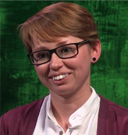
Gabrielle Johnson

David Dixon
Gabbrielle Johnson is a sixth-year Ph.D. student in the Department of Philosophy. She received the UCLA Distinguished Teaching Award in 2016-17. Her dissertation is within philosophy of psychology and concerns the structure and content of implicit bias. David Dixon is a philosophy major and chief editor of the UCLA undergraduate philosophy journal Meditations.
DD: What brought you to philosophy and when in your life did that happen?
I came into college not knowing anything about college. I was the first in my family to go to college and, in fact, my dad hadn’t finished high school. The only reason I applied to college was because my high school counselor had pressured me to. So, I submitted exactly one application—to Ohio State University—the day it was due.
I started as a math major, then I switched to political science. Then I took a philosophy class taught by Robert Kraut.
If you’ve ever met Professor Kraut, you’d know it’s a bit of an understatement to say he’s a boisterous person who makes his opinions clear. Students would enter thinking there’s no right answer to these philosophical questions, but he taught us early on that there was, that there are better or worse ways to approach the issues, and by being systematic and rigorous we can be confident that the answers we arrive at are the right ones. I was fascinated both by the philosophical method and how he employed it.
The final push came one day when Professor Kraut asked me, in the middle of class, “Are you majoring in philosophy?” And I was like, “No.” And he responded, “You are now. Come see me.”
DD: What brought you to UCLA?
However little I knew about college, I knew even less about graduate school. My advisor, Ben Caplan, had done his graduate work at UCLA. He helped give me a perspective on what the philosophical circuit is like and which schools are best for which topics. So, I was vaguely aware of UCLA and its prestige. I applied to as many schools as I could afford. But, my top choices were MIT, Rutgers, and UCLA.
I definitely wanted to come to L.A. Just moving from rural Canton to Columbus was a huge culture shock for me—I thought Columbus was “the big city”. The prospect of going to Los Angeles—an even bigger and even farther away place—was very enticing for me.
I’m happy at UCLA. As a grad student you become more aware of problems in the profession having to do with inclusivity, department atmosphere, and graduate student-faculty dynamics. Thankfully, the department does well in taking issues seriously, making sure we’re familiar with them, and working to ameliorate them. I often say to prospective students that while I’ve been here, grad students have raised some serious issues, which happens in every department. And, like in other departments, there’s been some disagreement about how to handle the issues. But one of the things I’ve never had to deal with—and that grads have told me they have to deal with in other departments—is convincing people that the problems deserve attention.
DD: Yeah. That sounds definitely to the credit and merit of the department. Let's move on to some more about you. Tell me about your research.
My area of specialization is philosophy of psychology, particularly perception and social cognition. My dissertation is on implicit bias—which has recently gotten a lot of hype both in public and academic spheres.
Essentially the idea is that there is mounting evidence that individuals who claim to have only egalitarian beliefs about members of marginalized demographics might harbor so-called implicit, or unconscious, attitudes that are at odds with those beliefs. These attitudes—that are unconscious but nevertheless affect what we believe about and how we treat other people—are what we call implicit biases.
A lot of the current work on implicit biases focuses on the normative issues surrounding the phenomenon, their various moral implications. Because I come from a hard-nosed philosophy of psychology approach, with roots in philosophy of language, I’m more interested in the structure and content of the mental states themselves.
The speed at which implicit bias became a popular conversation topic did it a disservice, because I think people picked it up and ran with it without thinking about the issue carefully. Throughout public conversations of implicit bias, I am disheartened to see the level of confusion and misunderstanding surrounding the topic. I’m hoping my work can contribute to a more careful understanding of the issue.
DD: It sounds like what happens to a lot of scientific findings after over-optimistic press coverage...
Definitely. People like to talk about how implicit biases could be responsible for overt discriminatory behaviors. And that talking point became popular, shaping public discussions of implicit bias. And it’s true: I do think they have a role to play in shaping behaviors; and understanding how this happens is deeply interesting, but also nuanced. So, when meta-analyses of tests like the Implicit Association Test or IAT began to show that these tests’ ability to predict behaviors were not so robust, the pendulum of popular opinion quickly swung back in the opposite direction. Now I think people are too quick to dismiss the possible effects of implicit bias as over-hyped. Probably the right answer is somewhere in the middle.
DD: You brought up the IAT. I've read recently that it doesn't have the kind of predictive validity or explanatory power that many people thought. Does the work you're doing on conceptualizing the content of implicit attitudes help in an interdisciplinary way to design better tests?
Absolutely! I’ll give you a mundane example—though I obviously don’t mean to ignore or trivialize the relevant social issues. Suppose you run a graphic design firm and you want to know how your employees feel about broccoli. And so you give them a test—a simple feelings thermometer that asks them to rank their attitude toward broccoli on a scale. Then you see that, in general, people rank their feelings high. What can we conclude from this test? It would be problematic to conclude that they think broccoli is tasty, since they might have given a high ranking to broccoli due to its vivid color, despite the fact that they think it tastes terrible. So, getting clear about the content of the attitude—whether it involves adjectives like “tasty,” “pretty,” or “healthy”—requires more finely turned calibration of the tests.
Many of the relevant meta-analyses weren’t controlling for subtleties in the purported content of the attitudes. It’s as if they were checking how well the employees’ rankings on the feelings test predicted their behavior of eating broccoli while they were on a diet. If you were someone that only ranked it high because it was a beautiful color (but you did not care for the flavor and were unaware of its health benefits), then we shouldn’t expect a strong correlation. So, getting a match between what we think the content of the attitude is and the sorts of behaviors we think the content predicts is crucial. That’s how I hope my work will help—by providing the theoretical resources to calibrate the tests that are ultimately within the purview of social psychology to dream up and to put into effect.
DD: I hear you just won the university’s top award for teaching. Can you tell us something about your approach to teaching?
I have two guiding principles in my approach to teaching: mindfulness and transparency. Since the classroom is full of students from diverse backgrounds, I want to be mindful of the different teaching practices that work best for each of them. I then try to adopt teaching methods that level the playing field for disadvantaged students. I also encourage my students to be mindful in this way by being transparent about my motivations for various teaching strategies. By sharing my reasons for choosing particular discussion topics or adopting specific methods, I cultivate an open and honest forum for class discussions. In the end, my students and I work together toward achieving classroom aims, and everyone takes on a little bit of responsibility for and ownership of that goal.
DD: Could you talk about the kinds of services and extracurricular activities you’re involved in outside your research and teaching?
Last year I served as the Teaching Assistant Coordinator (TAC). My favorite aspect of the job was teaching the department’s training seminar for first-time TAs. It involved sharing some of my own experiences—telling them some things I was nervous about my first time, and what they can expect. I also taught about broader, pedagogical topics: creating an inclusive classroom, combating stereotype threat or imposter syndrome, or engaging students beyond lecture. I’ve really enjoyed being a part of that. I’m proud that our department fosters an environment where people take teaching seriously.
I also started the Minorities and Philosophy (MAP) Chapter at UCLA with help from Femi Taiwo and Jennifer Kanyuk (and Kim Johnston’s been a big participant in keeping it going!). The first issue we wanted to confront was the “pipeline problem” in philosophy: male and female undergrads enter philosophy in roughly equal numbers. But then women “drip out” of the discipline to the point where only about 20% of tenure-track appointments go to women (and only 15% of philosophy Ph.D.’s are awarded to people of color).
One of my interests going into MAP was concern for philosophers like me who come from lower socioeconomic backgrounds. As far as I know, the numbers aren’t available for that sort of thing, but national collegiate trends for continuing education for individuals from those backgrounds isn’t promising. We created a graduate-undergraduate mentoring program. As mentioned, I knew basically nothing about higher education when I was an undergraduate. For me, just having someone to talk to about opportunities was pivotal in my decision to continue my education. That’s what I wanted to make available to these students as well.
I also helped found a youth outreach program at the LA LGBT Center. Every two weeks we hold a seminar at the Center. Participants are roughly at high school level. Most people don’t get exposed to philosophical thinking until college, and not everyone gets that opportunity. So it’s a chance for students to engage in critical inquiry. For example, we will bring up a philosophical topic like, “What is justice?” And then we’ll do some abstract thinking about what it takes for something to be just, and have them relate that to their own experiences with say, police violence or LGBTQ discrimination. They really enjoy it. One of the regulars recently told us that he registered for classes at Santa Monica Community College. His philosophy course was the first one he chose. Seeing that the program has made a difference in these individuals’ lives has been really rewarding.

